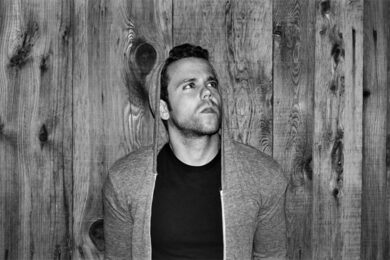Anthony Gonzalez, the man behind M83’s shoegaze-tinted electronic pop, has a new album coming out on 17th October entitled Hurry Up, We’re Dreaming. The follow up to 2008’s roundly acclaimed Saturdays=Youth, it’s a continuation of the vaguely nostalgic, sepia-tinted sound he’s been slowly developing over the last few years. Except this time it’s twice the length – Hurry Up is that grandest (and potentially deadliest) of statements, the double album. In the run-up to its release next month we caught up with Gonzalez to find out about what’s influenced his new music, and why he’s decided to record a double album.
How did the new album all come together?
Anthony Gonzalez: We toured a lot for the last one, and so I took a long break after, and worked on other projects. Then I moved to LA.
Was LA a big influence on the record?
AG: You know, the environment is always a big influence, especially when you move to a different country, a different continent. America is very different from France, and Europe. So I think the album wouldn’t have sounded the same if I’d done it somewhere else. LA’s huge. What I like about it is the amount of different landscapes there are there – you drive your car 20 minutes you’re at the beach, you drive 2 hours you’re at the desert, you have the mountains, it’s amazing. For this album I took a lot of road trips for three or four days, just by myself with my computer and my keyboards, going to the desert to write music on the road – you see amazing landscapes, it’s super inspiring.
So why a double album?
AG: I love big, ambitious projects. It’s what I like in movies and also in music. I don’t know, I’ve always been fascinated by artists that release double albums, it’s a huge amount of work, and a lot of the time it’s so much to dig into. I love that as a listener. When I was a teenager I got into Smashing Pumpkins’ Mellon Collie & The Infinite Sadness, and said to myself ‘I have to do something like that’. This felt like the right moment to do a double album. The music industry’s changing so fast, it’s starting to become more about singles, and for me this album is more a way to say to people ‘this is how I see music’. I’m an old school person, I like to go to a record store to buy vinyl and CDs, and mp3 isn’t really my thing. It’s a statement.
There’s always a risk with making a double album that it gets bloated and incoherent though. It’s not like that hasn’t happened to a lot of artists before. It’s a lot easier to listen to 40 minutes than 80 plus minutes of music – how have you gone about expanding without losing focus?
AG: The way I see this album is more like two albums. You can listen to each separately. It’s really two very similar albums – it’s not like one is obscure and one is very pop – it’s more like combinations of lots of different styles in one. It’s not necessarily that long, it’s as long as Before The Dawn Heals Us – I wanted to make sure it wasn’t too long and too pompous.
Midnight City by M83Over the last couple of albums you’ve moved further away from more instrumental/electronic stuff into more song-driven material.
AG: It’s more song-driven, yes. I feel like this album’s a mix of all my albums put together, there’s a lot of songs that remind me of Before The Dawn Heals Us – this one’s way more cinematic than the previous one. It feels more like a journey. I feel like I’m growing up, and my music is growing up as well.
How have you found translating your music to a live audience?
AG: The concept of my music is layers and layers of sound, and you can’t really do that for a live show because it sounds messy. So the idea is to find the right balance between something very produced and something more live, more intimate. It’s hard to find, but when you’re playing every day for a long period of time you have a long time to practice.
Is layering sounds up always the way you’ve written?
It’s always the same process, I always start with keyboards and synthesisers, then start to work on structure, vocals. This album is a bit different because there’s more vocals, and with some of the songs I was trying to focus on hooks first.
Do you often get to the point where you stack too many layers into tracks, and you have to start taking stuff away?
This is my problem! This is a big issue for me, I always want more and more, it’s hard for me to tell myself that I need to stop. Sometimes other people have to tell me that. I’m a perfectionist and I want to make sure everything is in place, and it’s always a war with the mix engineer, because most engineers have a pretty precise idea of how they want things to be. For me, music has no rules, I don’t care about fucking technique or whatever, I hate that. I really try to work on a droney sound that everything works together within, even if it’s hard to mix – so that everything in the session is there for a reason.
Hurry Up, We’re Dreaming is released on October 17th



